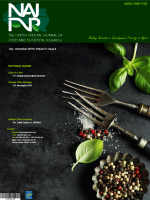Main Article Content
Beneficial effects of a fermented maize product with its supernatant, Lactobacillus fermentum and Lactobacillus brevis in rat model of colitis
Abstract
Background: African fermented foods such as maize cereal (Ogi ) and its supernatant (Omidun) are reservoirs of beneficial lactobacilli and carboxylic acids. Based on their constituents, their beneficial effect in a rat model of 2,4,6-trinitrobenzene sulphonic (TNBS) acid-induced colitis was assessed in comparison with two lactobacilli in a rat model of colitis. Methods:Female Wistar rats were distributed into seven groups of 5 rats each; the rats were pretreated for 14 days prior to colitis induction with Ogi, Omidun, L. fermentum, L. brevis and 7 days post colitic induction. Colitis was induced by an intracolonic administration of TNBS. The response of the rats to treatment was assessed macroscopically and biochemically.Results:Treatment with the Dexamethasone, Ogi and Omidun resulted in a significant reduction in colonic damage score and weight/length ratio (p<0.05). Treatment with Ogi, Omidun, L. brevis, and dexamethasone significantly prevented depletion of colonic glutathione and superoxide dismutase. The up-regulation of myeloperoxidase activity was inhibited in all treated colitic rats (p<0.05). However, Ogi appears to produce a better protective effect than the other treatment groups. Conclusions:This study reports that Ogi protects Wistar rats against the deleterious effect of trinitrobenzene sulphonic acid better than pure lactobacilli strains.







